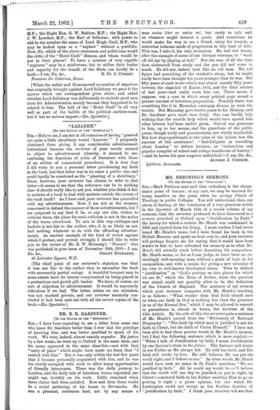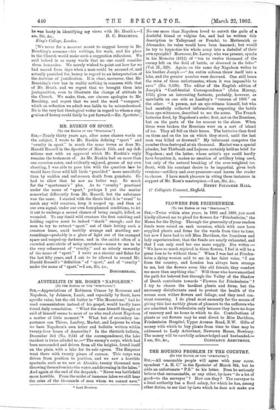MR. BEECHING'S SERMONS.
[To THE EDITOR OF THE SPECTATOR :1 Sin,—Mark Pattison once said that orthodoxy is the clergy- man's point of honour ; at any rate, we may be excused for being sensitive on the point when we occupy Chairs of Theology in public Colleges. You will understand, then, my alarm at finding, at the conclusion of a very generous notice in the Spectator of March 15th of a recent volume of my sermons, that the reviewer professed to have discovered in a sermon preached at Oxford upon "Justification by Faith" the heresy for which a certain Mr. Heath was condemned in 1862 and ejected from his living. I must confess I had never heard Mr. Heath's name, but I have found his book in the British Museum'and spent an hour over it; and your reviewer will perhaps forgive me for saying that it would have been kinder in him to have refreshed his memory as to what Mr. Heath did actually teach before launching his comparison. Mr. Heath seems, so far as I can judge, to have been an ex- ceedingly well-meaning man, without a grain of logic in his composition, and with a mania for giving a new meaning of his own to well-known theological terms. Thus he defined " justification " as " God's putting us into places for which we are fit," which the Dean of Arches, when the question was raised, could not possibly allow to be the definition of the Church of England. The sentence of my sermon which your reviewer compares with Mr. Heath's teaching is as follows : " What wonder then that faith should save us when our faith in God is nothing less than the presence in us of the Eternal Son," which I may be allowed to remark in parenthesis is, almost in terms, the doctrine of the 13th Article. By the side of this the reviewer puts a sentence of Mr. Heath's quoted from the "Dictionary of National Biography " : " The faith by which man is justified is not his faith in Christ, but the faith of Christ Himself." I have not been able to find these precise words in Mr. Heath's sermon, but I find the following sentence, which is more explicit:- '`
When I talk of Justification by faith, I mean Justification by our Saviour's trust in the future. The Saviour still trusts in our Father as He always did. He still has faith, and His faith still works by love. He still believes He can put the world right, and I believe so too." In other words, Mr. Heath would have seen no sense in St. Paul's assertion, " We are justified by faith." All he could say would be I believe that the world will one day be justified, or put to right, by Christ's continued faith in the Father enabling Him to go on putting it right ' ; a pious opinion, but one which Dr. Lushington could not accept as the Pauline doctrine of " justification by faith." I think your reviewer will see that he was hasty in identifying my views with Mr. Heath's.—I
[We never for a moment meant to suggest heresy in Mr. Beeching's sermons—his writings, his work, and his place in the Church would make such a suggestion ridiculous. We said indeed in so many words that no one could consider them heterodox. We merely wished to point out how far we had moved from days when a man could be accused of, and actually punished for, heresy in regard to an interpretation of the doctrine of justification. It is clear, moreover, that Mr- Beeching's view has in reality nothing in common with that of Mr. Heath, and we regret that we brought them into juxtaposition, even to illustrate the change of attitude in the Church. We make, then, our sincere apologies to Mr. Beeching, and regret that we used the word " compare," which on reflection we admit was liable to be misunderstood. He is the very last theological writer in regard to whom a sug- gestion of heresy could fairly be put forward.—ED. Spectator.]











































 Previous page
Previous page